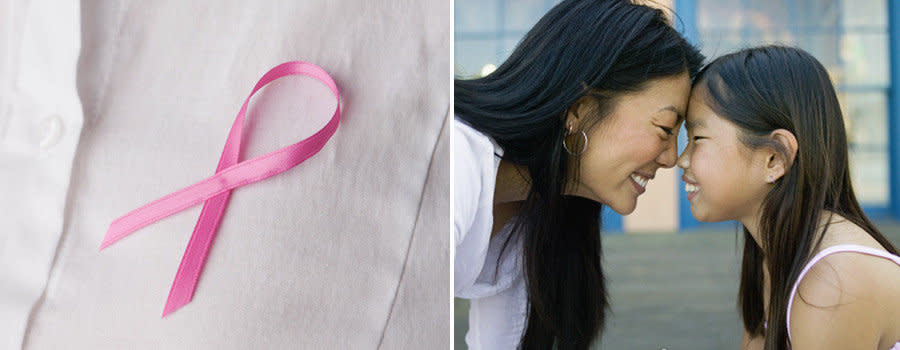A Family History Of Breast Cancer May Not Seal Your Fate

Dr. Christine Teal had never been flagged for suspicious lumps in her breasts, nor had she tested positive for mutations in the breast cancer susceptibility genes, which greatly increase a woman's risk of developing the disease.
But Teal -- who is chief of breast surgery at George Washington University Hospital -- nonetheless opted to undergo a preventive double mastectomy, electing to have surgeons remove both her breasts.
"There are genetic breast cancers out there that are not part of BRCA. That was the case with my family," Teal explained. Her mother was twice diagnosed with the disease -- most recently with aggressive, stage III cancer -- but tested negative for BRCA1 and BRCA2 mutations, meaning Teal herself was never tested.
Yet the breast cancer expert said the sheer aggressiveness of her mother's disease filled her with anxiety.
Love HuffPost? Become a founding member of HuffPost Plus today.
"For me, it was pretty straightforward," Teal said. "I didn't want to worry for the next 40 years."
For many women, understanding their breast cancer risk and determining what preventive options are available to them are intensely daunting tasks. But new research published last week may lend clarity to at least one piece of the puzzle.
In a study published the Journal Of Clinical Oncology, researchers looked at more than 3,000 families, nearly 300 of which had breast cancer susceptibility gene mutations present.
Women who had first-degree relatives -- i.e. mothers, sisters or daughters -- with BRCA1 or BRCA2 mutations, but who were themselves negative were at no higher breast cancer risk than average women, the researchers found. That finding runs counter to an earlier study that suggested such "non-carriers" with first-degree relatives still had between a two- and five-fold increased risk of breast cancer.
"When published in 2007, that study caused people a lot of concern," said Dr. Allison Kurian, one of the study's authors and an assistant professor at Stanford University's School of Medicine. "It caused investigators concern, it caused physicians concern and in our cancer genetics clinic at Stanford, we got a lot of phone calls."
The new study, Kurian said, was "reassuring." It found no increase in breast cancer risk among women who tested negative for BRCA, prompting the authors to conclude that such non-carriers can safely follow the same cancer screening guidelines as women in the general population.
And this, many outside experts agree, is indeed reassuring.
Amber Trivedi, a senior vice president with provider and client services at InformedDNA, a genetic counseling company, said the earlier study did not drastically change the standard of care so much as it made people in the genetics community nervous about their recommendations. She said doctors are generally hesitant to recommend a preventive mastectomy for interested women who do not have relatively clear-cut increased risk, like a BRCA mutation.
Yet Trivedi, who is also an expert panelist with Bright Pink, a nonprofit providing support to women at high risk for breast and ovarian cancer, said she does encounter women with less well-defined risk factors who grapple with their options.
"Certainly there are some patients who would consider undergoing preventive mastectomy anyway -- if they have a really striking family history with multiple generations diagnosed at fairly young ages, for example," she said. According to the National Cancer Institute, existing data suggests the procedure may cut women's risk by up to 90 percent.
For her part, Teal has dealt with many patients -- both with and without BRCA mutations -- who she says are afraid to ask about more aggressive prevention options. This is largely why she has shared her story with news outlets, including Washingtonian and ABC.
But even she is cautious when it comes to recommending more aggressive options for women without known breast cancer genes.
Teal tells the story of one patient she'd been working with for years who had a strong family history, but who could not be tested for BRCA because of logistic complications. That patient confronted her after watching Teal's story on Good Morning America.
"She came to me and said 'Why didn't you offer this to me?' And I didn't really have an answer for her," Teal said. "It's such a grey area and that's a perfect example -- she hadn't been tested, the family hadn't been tested and you're wondering, 'Is this patient going to have unnecessary surgery?'" Indeed, like most surgeries, mastectomy has notable risks.
But in 2007, researchers published a relatively small study in the Annals of Surgical Oncology that found 84 percent of respondents who had undergone preventive removal of both breasts were satisfied with their decision to have the procedure. The researchers concluded the procedure neither positively nor negatively impacted long-term psychosocial outcomes.
Other studies found that women were relatively content with the level of information they had before the procedure, except when it came to wanting to know more about their breast reconstruction issues.
"We found that generally women were highly satisfied with the decision," said Ann M. Geiger, MPH, Ph.D., associate professor of Public Health Sciences at Wake Forest Baptist Medical Center and co-author of the study, explaining the research was done before BRCA tests were widely available. "And they felt reasonably well informed about most things."
She said the challenge was, and remains, helping women understand what their risks are and put them in context before they decide what to do.
That, researchers hope, is what this most recent study might help to do -- at least in small part.
"There's no doubt that women can still have other risk factors for breast cancer and we wouldn't want to give the message that just because you don't carry this gene, you don't have risk," Kurian said. "You have to carefully consider your other risks but this goes a long way in allaying people's concerns over this question."

This article originally appeared on HuffPost.

